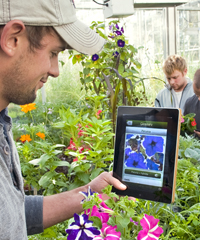AMES, Iowa - A smart phone application developed by Iowa State University that started as a classroom tool has now blossomed into a resource for master gardeners and home garden enthusiasts.
The app, called "Mobile Educator: Flowers 101," helps gardeners identify more than 250 garden plants by using the plant's features - color, height, growing zone, etc.
"This started out as an app for my class on herbaceous ornamentals, in which students have to learn 200 to 250 annual and perennial plants, mostly flowers," said Cindy Haynes, associate professor of horticulture. "But the more I talked about it with friends and gardeners, they all said they would like to have it for their own use."
While the app doesn't identify plants visually - that feature is hopefully coming, says Haynes - it has many advantages over traditional field guides.
"Since it's part of the phone, and your phone goes everywhere with you, it will always be with you," said Haynes.
It can also be used to find the right flower or plant for a garden.
If a home gardener wants to find a specific plant to grow, say a yellow flower that grows to 12 inches high and also does well in a Midwestern climate, he will be able to find at least one plant that fills those requirements, explained Haynes.
 The app also
has flash cards about each plant that include common and
scientific names. ISU photo by Bob Elbert
The app also
has flash cards about each plant that include common and
scientific names. ISU photo by Bob Elbert
Also, Haynes points out a function that allows users to "tag" certain plants that will be included in the app's universal database. Anyone with the Mobile Educator: Flowers 101 app looking for that plant will be able to locate an example nearby with the app.
The app also has flash cards about each plant that include common and scientific names.
The app features significant cultural information about each plant as well. In horticulture, cultural information refers to the areas of the country in which a particular plant does well - sunlight requirements and other aspects of growing conditions that determine its success.
There are also games that were originally intended for the classroom and student reference, but are components that may be fun and valuable to garden enthusiasts, says Haynes.
Haynes began the project with Michael Reinert, former ISU assistant professor who now develops apps full time.
The project was almost two years in development and Haynes said getting the final product was really worth the wait.
"The students are using it in class, and it has been very helpful for them," she said. "They have found little bugs with the app before its release, so, it has been very well tested."
The app was developed with help from Medl Mobile, a California company specializing in apps for smart phones.
In the classroom, Haynes is eager to find out if the technology will provide greater any learning advantages for the students.
"Most students have their own smart phone. If they don't have a smart phone, we are loaning students an iPod Touch for the semester," said Haynes.
"I am going to have half the class use the app for the first part of the semester and the other use the app for the second half of the semester," she said. "Then I'll check their results to see if scores are affected."